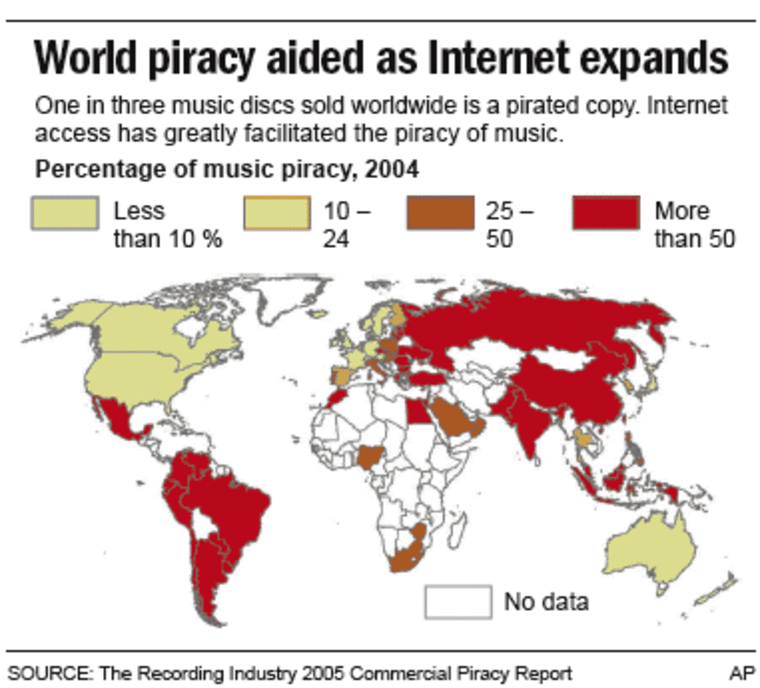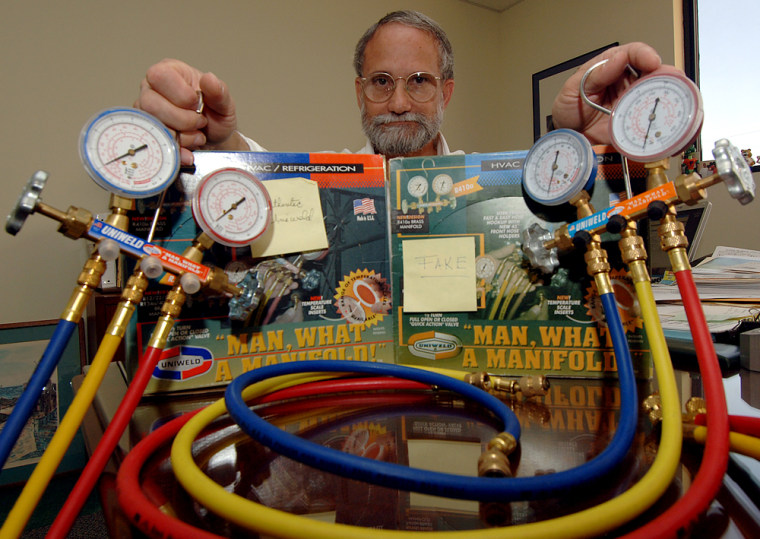By the time David S. Pearl II finally saw one of the knockoff versions of his company’s refrigeration testing devices, the damage had been done.
For more than 35 years, Uniweld Products Inc. had painstakingly built its reputation in the air conditioning hungry Middle East. But as the cheap counterfeits entered the market, sales plummeted. Workers were laid off, consumer confidence destroyed.
The reason for Uniweld's misery sat before him, just out of an express-mail package: a Chinese-made, nearly identical version of the real thing — one of a flood of pirated American products, the bulk from China, that the United States blames for costing thousands of jobs, robbing companies of profits and seriously harming the U.S. economy's ability to compete.
In Pearl’s case, the bogus equipment matched the original right down to the name, trademark, address and phone number of his manufacturing company's headquarters in Fort Lauderdale, Florida.
The differences, though, were crucial: The fake products cost half as much as the real ones, and they didn't work. Pearl estimated that over the years Uniweld lost well over a million dollars, a significant amount for a small company.
“You look at them side by side, it is absolutely amazing how well they copied them, and it's scary,” Pearl, Uniweld's executive vice president, said. “The United States is a country of thousands and thousands and thousands of small businesses, who employ the majority of the employees in the country. For them to be hammered by Chinese counterfeits is a serious problem.”
U.S. lawmakers, government officials and businesses agree that stopping the theft of American brands abroad would save companies billions of dollars and would help to correct a U.S. trade deficit that hit an all-time high of $202 billion with China last year.
But the accord often ends there.

Businesses want lawmakers to do more; the U.S. Congress urges the Bush administration to take a harder line on China's alleged lax enforcement of existing copyright protection laws; and the U.S. government threatens China with punitive action in the World Trade Organization if progress is not seen.
Meanwhile, rampant theft of copyrighted American products continues.
Worldwide, officials estimate that piracy and counterfeiting cost U.S. industry as much as $250 billion a year.
China is a major culprit, U.S. officials say, accounting for nearly 70 percent of all pirated products seized at the U.S. border last year — more than 10 times greater than any other American trading partner. Russia is also seen as a problem, with American business groups urging stronger pledges from Moscow to protect intellectual property before being allowed WTO entry.
Sen. Carl Levin, a Democrat who represents Michigan's auto parts makers, says China is thought to be responsible for about $9 billion of the $12 billion in estimated losses that that industry loses annually to counterfeits.
“There China sits while our government dawdles,” Levin told a recent congressional advisory panel. “We need to stop merely putting China on lists and start taking more effective action.”
U.S. officials say they are working hard to get Beijing to more aggressively fight the problem and to follow through on commitments made when China joined the World Trade Organization in 2001.
The United States posted its first intellectual property attache in Beijing in 2004 and plans additional attaches this year; dozens of copyright protection training programs have been conducted with Chinese officials since 2001, the U.S. government says.
Last year, America's trade envoy formally requested that China document what it was doing to enforce copyright protection under its WTO obligations; though China's response was "less than forthcoming," officials say they continue to push for those details.
The United States has also placed China on a U.S. “priority watch list” over concerns about Beijing's failure to improve protection of U.S. intellectual property.
‘Measured progress’ in China
A meeting between top U.S. and Chinese officials on the eve of President Hu Jintao's April visit to Washington "yielded measured progress" on the issue, according to Timothy Stratford, an assistant U.S. trade envoy for China affairs. China committed to take stronger action against producers of pirated optical discs and to make sure computers are pre-installed with legal operating system software.
Still, many were disappointed Hu did not make greater commitments to crack down on piracy when he met with U.S. President George W. Bush.
Above all, the United States has signaled its willingness to wield what's considered one of its most powerful weapons: a formal WTO complaint against China for inadequate enforcement of copyright protections; a ruling against China could lead to strict sanctions.
“Results are what matter to us,” Stratford recently told the U.S.-China Economic and Security Review Commission. “We will not shy away from using dispute settlement at the WTO when we feel China is not living up to its commitments.”
‘A paper tiger’
Critics say warnings are meaningless. The U.S. trade representative's office, Levin said, “is a paper tiger, I'm afraid.”
Lack of government leadership, the senator said, has forced the auto industry to "do too much of the policing itself and at great expense."
Bill Primosch, director for international business policy at the National Association of Manufacturers, said the U.S. government is faced with obstacles as it considers a WTO case. First, he said in an interview, it must make sure it can win. If the WTO ruled against the United States, for whatever reason, it could send a message to Beijing that its current approach is sufficient.
Fear of retaliation
Another problem is a reluctance by U.S. companies to cooperate publicly. Primosch said many are afraid that if they complain too loudly, China will retaliate, forcing them out of what's considered the most important major growth market in the world for U.S. manufacturers.
Until the problem is solved, industry representatives say many U.S. companies eyeing China face bleak prospects.
Patricia Schroeder, president of the Association of American Publishers, estimated in recent testimony that U.S. publishers in China lost $52 million last year, part of a "staggering amount of book piracy plaguing this most promising of markets."
Schroeder, a former member of Congress from Colorado, summed up the problem faced by many U.S. industries working in China: "China is a country that boasts millions upon millions of eager potential readers and scholars," she said.
"And these readers are largely being supplied with illegal goods."
